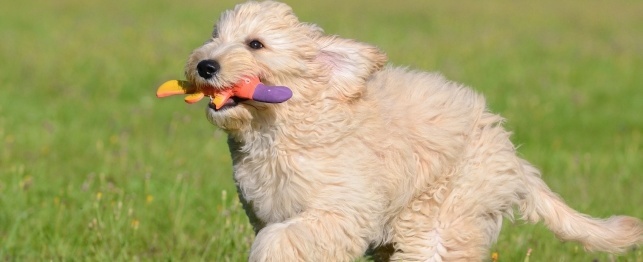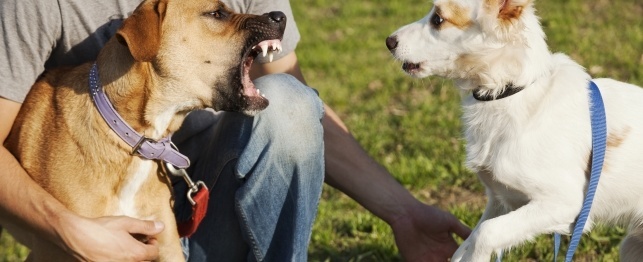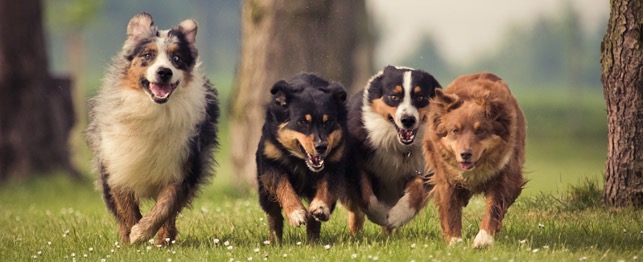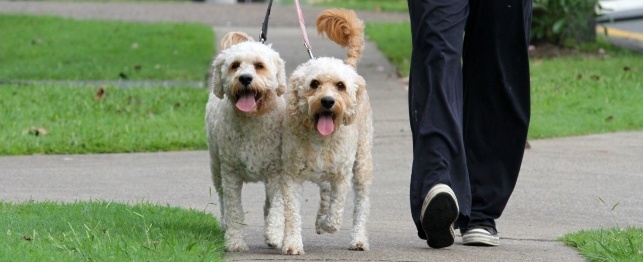If you have lived your life with a dog then you have probably encountered some common dog behavior problems at least once or twice. You may have been left wondering why dogs do the things they do. Things like barking, biting, chewing and other ordinary dog behaviors are quite common but they are often misunderstood by dog owners and, consequently, mishandled. On the other hand, perhaps you are new to owning a dog, or you are just in the process of thinking about getting a dog. Maybe you want to learn to better understand your dog's behavior problems. Understanding the motivations for your dog's behavior is the first step in learning to modify or prevent the behavior. You can then approach the problems through obedience training to help you prevent and control their behavior problems.
What follows are some common dog behavior problems and the reasons why dogs pursue these behaviors.
1. Dogs Bark
It's no secret that dogs bark. This behavior takes several forms, from simple barking to howling to whining. It's when the barking becomes excessive or continuous that it is considered a behavior problem. Before you can solve the problem you need to determine why your dog is barking. The most common reasons for barking are:
Playfulness/Excitement
Seeking Attention
Warning
Anxiety
At different times any of these reasons for barking can be justified. There is nothing inherently wrong in playful barking or even barking for a little attention. But taken to extremes, barking becomes a problem.
To overcome problem barking you will need to learn to control the behavior. You should first teach your dog to bark on command. Then you can teach him to stop barking on command. When your dog barks (which he already knows how to do), say "speak." Give him praise and encouragement for barking. When he stops barking say "stop" or "enough." Give him lots more praise. If you repeat this exercise frequently your dog will get the hang of it. But you must be consistent with your commands and your praise. If your dog doesn't stop barking on his own, try a loud noise to startle him into stopping, such as shaking a can of pennies. Then stay "stop" or "enough" and praise him.
If your dog continues to bark at every squirrel that enters your yard or every leaf that falls you may want to consider a bark collar. But the best thing you could probably do for your dog is to make sure he is getting enough exercise. Many times dogs bark because they are simply feeling good and they're excited. Let them run off some energy and they will be more inclined to rest at home.
2. Dogs Chew
Most of us know that dogs chew. They chew shoes, remotes and other things left lying around the house. Of course, chewing is perfectly natural for dogs. It only becomes a problem when dogs chew things they aren't supposed to chew. The most common reasons dogs chew are:
Boredom
Puppy Teething
Anxiety
Curiosity (how does it taste, feel, etc.)
The best thing you can do for your dog is to provide him with his own things to chew on. If he has his own toys and things to chew he is less likely to chew yours. This may not solve the problem completely, but it will help. You will also have to learn to keep some of your more precious personal items out of your dog's reach, at least while he is in the teething/puppy stage. Puppies do not know all of the house rules yet and they may not be able to tell the difference between their toys and your more expensive toys, such as cell phones and sunglasses. They will make mistakes.
When you have to leave your dog home alone you may want to consider crating him or confining him to one area of your house to limit his access to chewable things. He won't be able to cause as much destruction this way. If you catch your dog chewing things when you're home you should correct him by making a sharp noise while he's in the act to startle him. Most dogs will drop what they're chewing on instantly. You can then replace whatever he's chewing on with a more appropriate chew toy.
In some instances dogs have to learn, item by item, what is not acceptable to chew on. Other dogs catch on faster and learn to leave people things alone. But even old timers can have relapses and decide to chew on something valuable.
One of the best things you can do for your dog, for many behavior problems, is to make sure they receive plenty of outdoor exercise. Tired dogs get into much less trouble as a rule.
3. Dogs Dig
Dogs like to dig. It's an instinct. Some breeds, such as terriers, are natural diggers. It's part of their hunting background. But all dogs will dig from time to time. Some of the most common reasons are:
Hunting Instinct
Nesting (comfort or cooling off)
Boredom or Excess Energy
Hiding Possessions (bones or toys)
Anxiety or Fear
To Escape or Gain Access
If your dog is digging holes in your yard, or if you're trying to have a garden and your dog is digging it up, it can be very frustrating. The best advice is to try to find out why your dog is digging. Is he searching for a mole? Is he trying to cool off in the summer? Is he bored? Is he burying something? Is he trying to dig under the fence? Figure out why he's digging and you can work on fixing the problem, though it may not be easy. Dogs can be quite determined about digging. You may keep filling in holes while your dog is digging new ones.
Spend time outside with your dog to see what he's doing. Make sure he's getting plenty of exercise -- you don't want him using digging as his main exercise. If he is determined to dig then you may need to set aside part of the yard where it's okay for him to dig. Maybe your dog needs a sandbox or a part of the garden for his very own.
4. Dogs can have Separation Anxiety
Many owners believe their dogs have separation anxiety. Whether they do or not is debatable. Many dogs do bark and cry when their owners leave them. They may misbehave in the house and destroy things. But whether they actually have genuine separation anxiety is not clear. Many dogs may simply be very unhappy to see their owners leave and their owners may feel very bad about leaving.
Dogs with genuine separation anxiety usually cannot stand to allow the owner out of their sight even when the owner is home. The dog wants to touch the owner constantly. They may have inappropriate urination and defecation from stress, and they may become destructive from anxiety when the owner leaves them for just a few minutes.
True separation anxiety usually requires treatment from a professional and help from a veterinarian. It takes training, behavior modification and even medication in some cases.
If your dog misbehaves when you leave the house but it is not genuine separation anxiety, you still have problem behavior on your hands. The best thing you can do is try to desensitize your dog to the stress of you leaving the house. Practice leaving the house and returning a few moments later. Pick up your keys and go out the door. Start your car and return to the house. Let your dog get used to the idea that leaving the house is not a big deal. Keep things very positive and up beat. Show your dog that leaving the house without him does not have to be something stressful. Teach him positive behaviors while you're gone. Make sure he has toys and things to keep him busy while you're away.
Most dogs don't want you to leave the house because they're bored while you're away. This is not true separation anxiety, which is a psychological condition based in anxiety. Alleviate your dog's boredom while you're away from home and you can improve his behavior when you leave the house.
5. Dogs can have Inappropriate Elimination
Inappropriate urination and defecation -- housebreaking problems -- can be very frustrating for owners. It can make your dog unwelcome in people's homes, in public places, and of course it can damage your home. Before you do anything else you should consult with your vet to make sure there is not a veterinary reason for the behavior. Your dog could have a health problem that is causing the behavior.
If you rule out a health problem then you can look at behavioral reasons for your dog's elimination problems. Dogs have inappropriate elimination problems for the following reasons:
Lack of Proper Housebreaking
Submissive or Fear Urination
Anxiety
Attention-seeking
Territorial Marking
Remember that inappropriate elimination is to be expected in puppies, especially before they are three months old. They need time to learn to hold their bladders and they can't be expected to go very long between potty breaks. Senior dogs can also have problems as they age. But dogs in the prime of life who are having problems with elimination are usually having some kind of behavior problem and you will need to figure out why they are doing what they're doing before you can overcome the problem.

 Five Games That Will Delight Your Dog
Five Games That Will Delight Your Dog
Five Games That Will Delight Your Dog
Five Games That Will Delight Your Dog
 Dog Parks and Bites: What You Need to Know
Dog Parks and Bites: What You Need to Know
Dog Parks and Bites: What You Need to Know
Dog Parks and Bites: What You Need to Know
 Parks & Recreation: 7 Tips for Enjoying Dog Parks
Parks & Recreation: 7 Tips for Enjoying Dog P
Parks & Recreation: 7 Tips for Enjoying Dog Parks
Parks & Recreation: 7 Tips for Enjoying Dog P
 How Much Exercise Does My Dog Need?
How Much Exercise Does My Dog Need?
How Much Exercise Does My Dog Need?
How Much Exercise Does My Dog Need?
 Dog Dudes: Surfing Dogs
Dog Dudes: Surfing Dogs
Dog Dudes: Surfing Dogs
Dog Dudes: Surfing Dogs